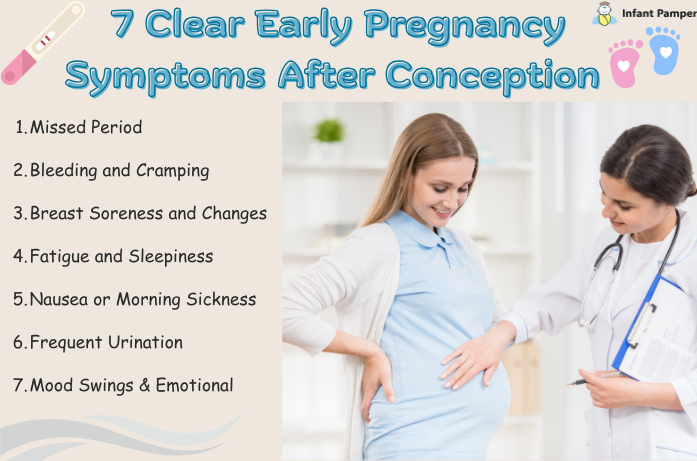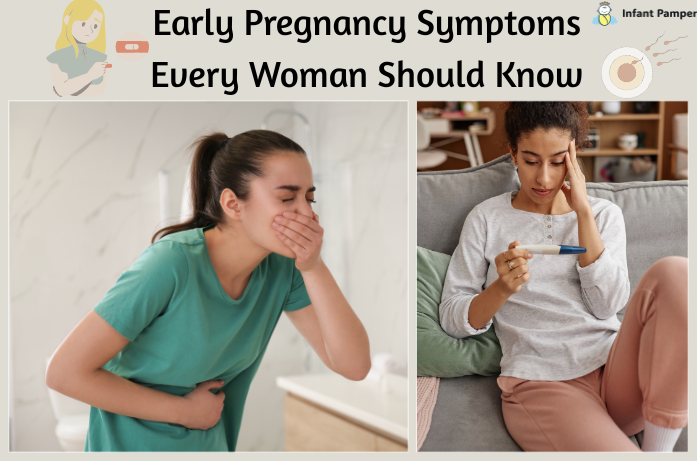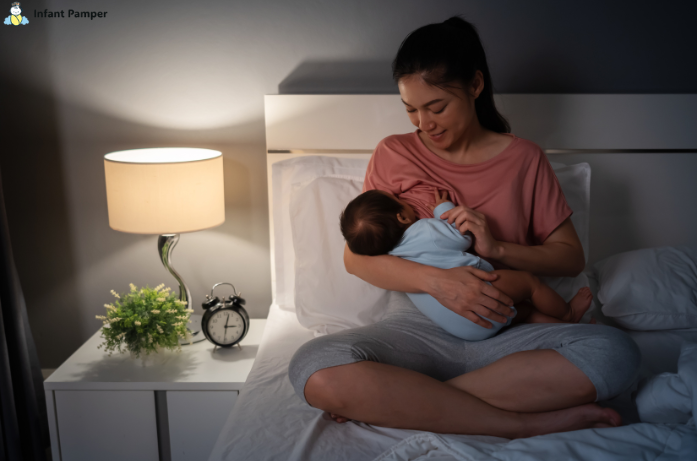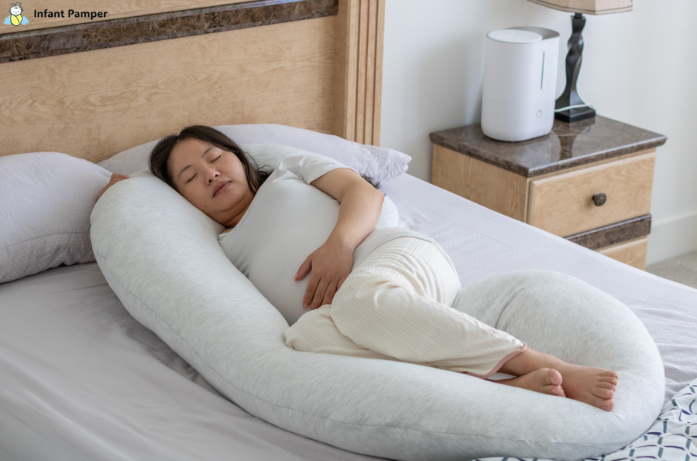By a Caring Mom at Infant Pamper
Every pregnancy journey begins differently, but many women experience early pregnancy symptoms even before a home pregnancy test confirms it. These early pregnancy signs after conception can appear as early as one week and continue through the first trimester of pregnancy. They may be subtle or obvious, and while not every woman will have all of them, being aware of these changes helps you understand what your body may be going through.
For first-time moms especially, recognizing these early signs brings reassurance, emotional readiness, and the opportunity to start caring for yourself and your baby early on. The symptoms you’ll read about below are not just biological signals, they’re your body’s way of quietly telling you something incredible is happening inside.

7 Clear Early Pregnancy Symptoms After Conception
1. Missed Period
A continued absence of menstruation is frequently slash the first noticeable and dependable find of pregnancy. In case you have a regular menstrual cycle and your period does not arrive when expected, especially after unprotected intercourse, it time to take a home pregnancy test.
Things to understand:
- The majority of women usually miss their period around Week 4 or 5 after conception
- Home pregnancy tests are most accurate after a missed period
- It’s advisable to have a test result confirmed by a physician in case of positive test result.
Missing your period doesn’t always mean you’re pregnant, as stress or hormonal imbalances can also delay your cycle. However, if it’s combined with other symptoms on this list, it is a strong signal that you might be pregnant.
2. Bleeding and cramping due to implantation
A fertilized egg moves down the fallopian tube and gets implanted in the uterus during the very first week after conception. When it attaches to the womb wall, implantation occurs and treating such women may sometimes involve light spotting and mild cramps.
This symptom generally occurs from the 6th to 12th day after ovulation along with:
- Mild cramping in the lower abdomen
- Light spotting (pink or brown in color)
- No clots or heavy flow (unlike menstrual periods)
This implantation bleeding vs period difference helps many women identify what’s happening. The bleeding is usually very light and lasts a few hours to two days. It’s among the first signs of pregnancy before a missed period, though not all women notice it.
3. Breast Soreness and Changes
Starting the second week post-conception, hormonal changes set the stage for breast feeding. Many women thus report sore breasts and noticeable changes in their chest area along with the hormonal shifts.
Breast-related symptoms in the early pregnancy period consist of:
- Breast soreness or tingling
- Swollen or fuller feeling
- Nipple and areola darkening
- Appearance of small bumps (Montgomery glands) around the nipples
These changes start in Week 2 or 3 and by Week 4 they become more visible. The hormone named progesterone is responsible for this since it increases blood flow to the breast thus making them more sensitive. This symptom is so common early pregnancy signs after conception that it usually persists through the first trimester.
4. Fatigue and Sleepiness
One of the most common and continuous early pregnancy symptoms is tiredness. Even if you sleep well, the extreme tiredness might begin as early as the third week after conception. According to the Mayo Clinic, increased progesterone levels and metabolic changes are key reasons behind early pregnancy fatigue.
What causes it:
- Rise in progesterone levels causes sleepiness and low energy
- The body is taking more energy to support the developing embryo
- There might be a slight decrease in blood sugar and blood pressure which adds to tiredness
Fatigue usually sets in around Week 3 or 4 and often climbs between Week 6 and Week 8. It may be one of the first signs that you come across. You may feel the need for naps, to go to bed early, or just feel worn out during the day.
5. Nausea or Morning Sickness
Nausea is an iconic sign of early pregnancy and can begin at Week 4; in most cases, it happens before a period is missed. Nausea is often referred to as “morning sickness”, it can happen any time of the day or night.
This symptom includes:
- An uneasy or upset stomach
- Vomiting (for some women, but not all)
- Strong reactions to certain smells or foods
- Food aversions or new cravings
The hormones such as hCG (human chorionic gonadotropin) and estrogen are the ones that cause this sensation. Most women become nauseous between Week 4 and Week 6, with symptoms usually reaching a peak around Week 9; however, pregnancies are individual. Some women have little nausea whereas others suffer from it more severely.
6. Frequent Urination
Approximately five weeks after fertilization, you might find yourself visiting the bathroom more frequently than normal. This scenario results from the change in hormones and more blood flow to the kidneys, so the bladder fills up faster.
Key things to notice:
- Strong urge to pee more often, even at night
- No burning or pain (which could indicate a urinary tract infection)
- No increase in drinking fluids, but still more times to use the bathroom
Frequent urination usually occurs from Week 5 or 6 and lasts through the first trimester. The enlarging uterus in the following weeks will exert more pressure on the bladder, but this early symptom is primarily caused by hormones and the increase in kidney functionality.
7. Mood Swings and Emotional Sensitivity
Hormonal alterations during the first trimester can greatly impact a woman in terms of her feelings and moods. Some women report extreme emotional and mood sensitivity and irritability during the first two months of pregnancy.
Common mood-related signs:
- Crying more easily than before
- Being irritable or moody
- Feeling overwhelmed, anxious or extremely happy
The ups and downs in feelings are the result of higher estrogen and progesterone levels, which in turn affect neurotransmitters like serotonin in the brain. Although the symptoms are similar to those of the menstrual cycle, pregnancy mood swings may seem stronger or last longer. It is perfectly normal to be more emotional during this phase.
What to Do if You Notice These Symptoms
In case you are experiencing one or more of these early pregnancy signs after conception, here is what you have to do next:
- For the most accurate result, apply a home pregnancy test with your first urine in the morning.
- If the result is negative and your period hasn’t started yet, try taking the test again after a few days.
- Schedule a visit with your doctor or OB-GYN if your test is positive. Early prenatal care is important.
- Introduce good lifestyles like taking prenatal vitamins, drinking plenty of water, getting enough sleep, and staying away from smoking or drinking.
When Should You See a Doctor Immediately?
While early pregnancy symptoms are typically normal, seek medical care immediately if you experience:
- Heavy bleeding or severe abdominal pain
- Dizziness, fainting, or fever
- Extreme nausea or vomiting
- Sudden loss of pregnancy symptoms after a confirmed test
These could indicate conditions like ectopic pregnancy or hormonal imbalance and require prompt attention.
Medical Disclaimer: This text is meant for informational purposes only and should not be taken as an alternative to medical advice. Do not hesitate to contact your doctor or knowledgeable healthcare provider regarding any questions or concerns connected to your pregnancy.
Final Thoughts
There are countless variations of women’s bodies, and also every pregnancy comes with its own peculiarities. Strongly felt early pregnancy symptoms are some of the experiences of a few women, whereas others may miss out on them completely. The common signs are breast tenderness, fatigue, nausea, and a missed period; along with these, your body soon receives soft signals that something extraordinary is taking place.
FAQs
1. How soon can pregnancy symptoms appear after fertilization?
Symptoms that are often very mild, such as tiredness, cramps, and breast soreness might be felt by some women one week or so after fertilization, possibly even before their period is due.
2. Is bleeding a normal occurrence during the first trimester?
The answer is yes; very light bleeding or implantation spotting can occur about 6–12 days after the egg is released. It is usually of very light pink or brown color and lasts barely a day or two.
3. What are the first pregnancy symptoms before a missed period?
Some of the frequently occurring early pregnancy symptoms are breast discomfort, tiredness, nausea, and mood changes, along with light bleeding, which could all be present before the due date of your period.
4. When should I take a pregnancy test for best results?
For the most reliable outcome, take a home pregnancy test using first-morning urine, which has the highest concentration of hCG, after your expected period.
5. What should I do after a positive pregnancy test?
The very first positive pregnancy test should prompt you to book a prenatal visit, besides which you should start taking prenatal vitamins, eat lots of fruits and vegetables, get enough rest, and be guided by your doctor for healthy beginnings.
At Infant Pamper, we think of every mom’s adventure as love, care, and trustworthy guidance. In case you suspect that you are pregnant, pay attention to your body, believe in your instincts, and take the next step with certitude.
For more caring advice on infant growth, parenting, and early motherhood, visit us at Infant Pamper, your gentle guide through pregnancy to parenting.




